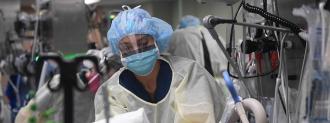A patient’s immune system may help predict who is more likely to develop severe cases of COVID-19, according to new research from scientists at Yale.
Their longitudinal study, published in Nature, examined the outcomes of 113 patients of Yale New Haven Hospital, tracking their immune response from admittance to discharge — or death. What they found were relationships between the amounts of immune system protein signals, called cytokines, and which patients had severe cases of COVID-19.
SARS-CoV-2, the morning star-like virus that causes COVID-19, provokes a highly unusual immune response, shutting down each individual cell’s defenses while allowing them to call for backup with impunity.
These unchecked distress calls bring sundry virus-fighting cells running, like Homer clones after a donut. The mass of reinforcements arrive to an immune system shipwreck — viruses and immune cells and cellular debris and inflammatory protein signals — and they freak out, leading to a cytokine storm.
This runaway immune response is thought to be responsible for many severe cases of COVID-19, up to and including death, as the horrible power of the body’s immune system is turned against it.
The revelation means that coronavirus drugs targeting the inflammatory response of the immune system may be effective treatments for COVID-19 patients.
But this imbalanced response could also potentially predict who will develop severe cases of COVID-19, as Columbia virologist Angela Rasmussen previously told Freethink.
The Yale study puts that to the test.
Researchers found the same immune system “signature” in all of the patients in the early stages of the disease.
“We were able to pull out signatures of disease risk,” senior author Akiko Iwasaki, a professor of immunobiology and investigator at Yale’s Howard Hughes Medical Institute, told YaleNews.
One signature was alpha interferon. Alpha interferon is a cytokine that gets called into battle to fight viruses. But weirdly, patients who had higher levels of alpha interferon had more severe cases of COVID-19 than those with less.
The cytokine (an immune system signal) appears to be hurting, not helping.
Akiko Iwasaki
“This virus just doesn’t seem to care about alpha interferon,” Iwasaki said. “The cytokine appears to be hurting, not helping.”
The presence of inflammasome, a group of virus-detecting proteins that cause inflammation, also didn’t bode well: high levels of these cytokines were associated with poor outcomes and, in a few cases, death.
The protein signals were not only portents.
For example, patients who had high levels of growth factors (cytokines that specialize in repairing cells) fared better than those who did not.
If these findings bear out across a larger patient population, they may help doctors predict who is in danger of suffering severe cases of COVID-19, triaging patients likely to benefit from limited drugs and in need of intensive care.
They could also serve as helpful clues as to what drugs, impacting which cytokines, may be to best treat the cytokine storm.
We’d love to hear from you! If you have a comment about this article or if you have a tip for a future Freethink story, please email us at [email protected]






